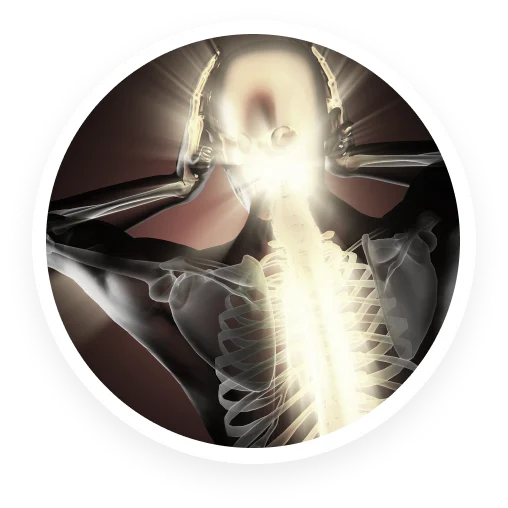
PTSD
Approximately 8 million adults in the United States suffer from Post Traumatic Stress Disorder (PTSD) symptoms.
Allen Finney
Review
Young ladies behind the counter were nice and professional. Dr. Khan was and is awesome. You felt he really cared which I have not felt in the 2 years I've been injured. Only reason I did not give it 5 stars was the hard time I had finding it.
Allen Finney
Review
Young ladies behind the counter were nice and professional. Dr. Khan was and is awesome. You felt he really cared which I have not felt in the 2 years I've been injured. Only reason I did not give it 5 stars was the hard time I had finding it.
charles griffin
Review
Have been doing a wonderful job with help with my nerve pain, listen to me, and my request no to be put on pain killers but to help find the problem, always return calls so glad is was referred to them.
Stacey Mejia
Review
Awesome staff Dr. Kahn is a really good Doctor he listens and is a helping man!! I appreciate all of your guys work you do for your patients!! You even call to give reminder the day before your appointment! Again that's so awesome!!
Forrest Hammer
Review
NOTHING BUT THE BEST. ABLE TO WALK. ABLE TO PERFORM TASKS THAT I COULDN'T FOR A LONG TIME, LIKE DAILY WALKING, BENDING OVER, CARRYING GROCERIES AND ENJOYING A MOVIE AT THE CINEMA. THANK YOU DR. ASIM KAHN.
Jeanne Neathery
Review
Dr RYklin is amazing. He treats each patient as if you’re his only one. I’ve been seeing him for 7yrs due to a neck injury. He definitely finds what pain management meets your individual needs. The practitioners are amazing as well!!!!
Marty Klopper
Review
Pain Dr office. Staff is friendly and professional. Lots of paper work to be filled out. Office was clean and neat. Masks on Staff at all times and required for patients to enter. Will be going back for follow-up appointments.
Kim LindL
Review
The staff is very pleasant and Dr. Khan is very good with a needle I've been getting epidurals and shots in my foot and lower back for about 4 years now, he is very good and I would never go to another place
Angel Bussert
Review
The doctor actually listens. I have been a patient for years and love the staff and doctors. I've been to all the locations the country club one is always super busy queen creek location is never packed so I go there.
Guy Romero Jr
Review
Every Staff personnel are very professional, courteous and patient respectful in caring for each medical problem. We live out in Laveen, but finding good patient care are hard to find, Truly Blessed Guy E Romero
John Crosby
Review
They do a great job in today's challenging health care system. Great Nurse Practitioners who work hard. Great support staff. Doctors are expert practitioners. Stable practice. I have over five years personal experience with them.
Stacey Mejia
Review
Awesome staff Dr. Kahn is a really good Doctor he listens and is a helping man!! I appreciate all of your guys work you do for your patients!! You even call to give reminder the day before your appointment! Again that's so awesome!!
Kim LindL
Review
The staff is very pleasant and Dr. Khan is very good with a needle I've been getting epidurals and shots in my foot and lower back for about 4 years now, he is very good and I would never go to another place
Guy Romero Jr
Review
Every Staff personnel are very professional, courteous and patient respectful in caring for each medical problem. We live out in Laveen, but finding good patient care are hard to find, Truly Blessed Guy E Romero
Angel Bussert
Review
The doctor actually listens. I have been a patient for years and love the staff and doctors. I've been to all the locations the country club one is always super busy queen creek location is never packed so I go there.
Forrest Hammer
Review
NOTHING BUT THE BEST. ABLE TO WALK. ABLE TO PERFORM TASKS THAT I COULDN'T FOR A LONG TIME, LIKE DAILY WALKING, BENDING OVER, CARRYING GROCERIES AND ENJOYING A MOVIE AT THE CINEMA. THANK YOU DR. ASIM KAHN.
Jeanne Neathery
Review
Dr RYklin is amazing. He treats each patient as if you’re his only one. I’ve been seeing him for 7yrs due to a neck injury. He definitely finds what pain management meets your individual needs. The practitioners are amazing as well!!!!
Marty Klopper
Review
Pain Dr office. Staff is friendly and professional. Lots of paper work to be filled out. Office was clean and neat. Masks on Staff at all times and required for patients to enter. Will be going back for follow-up appointments.
John Crosby
Review
They do a great job in today's challenging health care system. Great Nurse Practitioners who work hard. Great support staff. Doctors are expert practitioners. Stable practice. I have over five years personal experience with them.
Carol Gravatt Davidson
Review
Absolutely the best place I have been too...so many doctors and always just prescribed pain pills for over 10 years. There is hope, after starting injections I feel so much better. I know I'm in the right place.
Tim Tuzon
Review
Been with Kahn for over a year and wouldn't want to be anywhere else. He is not a pharmacy! He solves the issues instead of hiding them with tons of drugs. Have had multiple procedures to correct the problems.
Brooke Keifer
Review
I was nervous when I brought my mom into the office. They are clearly a very busy office, but the front staff was kind, and the doctor was very confident in a treatment plan. Overall my Mom was very pleased with her visit.
Kari Lynn Plo
Review
I love Dr Ryklin and his assistant Liza! They've always been super good to me and very sympathetic to all my needs! They've done everything they can to make me comfortable and to help me with my pain! I'd refer anyone to them!
Lacey Smithson
Review
This office keeps getting better every time I go. Staff is friendly, doctors are very well educated and good at what they do. And they have helped decrease my mom's back pain by 80%! Everyone with pain should go to this place!
Katty Miller
Review
Dr. Khan is truly carrying, understanding and the VERY BEST AT ADMINISTRATING SGB INJECTIONS!!! I look forward to driving from California to be seen by him. I just can't say enough. Thank you Dr. Khan.
Britt Montoya
Review
Great place. Dr Khan is an awesome Dr and goes above and beyond to help you. Meghan is a wonderful P.A. as well. It says so much to have a Dr that truly cares about your outcome of your procedures. This is a goodhearted Dr
Julie Kierzek (Julz)
Review
Love them all. Dr Ryklin is so helpful and understanding. He takes helping people seriously & I'm extremely grateful for everything he & the PA's & MA's have done for me. Dr Ryklin has gone above & beyond for me.

What is PTSD?
Post Traumatic Stress Disorder or PTSD occurs in people who have experienced a traumatic event or series of events. Individuals may experience this as emotionally or physically painful and it can affect mental, physical, social, and/or spiritual well-being.
A traumatic event is any event, or series of events, that causes extreme stress. These events make someone feel a sense of horror and helplessness, or that the event will cause serious injury or death.
Examples of traumatic events include natural disasters, severe accidents, war/combat, sexual assault, or partner violence.
What are the symptoms of PTSD?
The symptoms of PTSD can vary in intensity and may develop shortly after the trauma or even months or years later. These symptoms can be grouped into four main categories: intrusion, avoidance, negative alterations in cognition and mood, and alterations in arousal and reactivity. Here are some symptoms in each category:
- Intrusion Symptoms:
- Distressing and intrusive memories of the traumatic event
- Nightmares related to the trauma
- Flashbacks, feeling as if the trauma is happening again
- Intense emotional or physical reactions to reminders of the trauma
- Avoidance Symptoms:
- Avoiding thoughts, feelings, or conversations related to the traumatic event
- Avoiding people, places, or activities that remind the person of the trauma
- Loss of interest or participation in once-enjoyed activities
- Feeling emotionally numb or disconnected from others
- Negative Alterations in Cognition and Mood:
- Persistent negative beliefs about oneself, others, or the world
- Distorted thoughts about the cause or consequences of the trauma
- Persistent negative emotions like fear, anger, guilt, or shame
- Feeling detached from others or difficulty maintaining close relationships
- Alterations in Arousal and Reactivity:
- Irritability, outbursts of anger, or aggressive behavior
- Hypervigilance, feeling constantly on guard
- Difficulty concentrating or staying focused
- Exaggerated startle response
It's important to note that experiencing some of these symptoms after a traumatic event is a normal response. However, if these symptoms persist for more than a few weeks, are severe, or interfere with daily life, it might be indicative of PTSD. If you or someone you know is experiencing symptoms of PTSD, it's recommended to seek professional help from a mental health provider. PTSD is a treatable condition, and therapy, medication, or a combination of both can be effective in managing its symptoms.
What causes PTSD?
Post-Traumatic Stress Disorder (PTSD) is typically caused by experiencing or witnessing a traumatic event. Trauma refers to situations that are extremely distressing, frightening, or life-threatening. Not everyone who experiences a traumatic event will develop PTSD; it depends on a combination of factors including the individual's psychological resilience, coping mechanisms, and support systems. Here are some common causes and risk factors associated with the development of PTSD:
- Traumatic Events:
- Combat exposure (for military personnel)
- Physical or sexual assault
- Natural disasters (earthquakes, hurricanes, etc.)
- Accidents (car crashes, plane crashes)
- Terrorism or acts of violence
- Medical trauma (serious injuries, surgeries)
- Childhood abuse or neglect
- Witnessing traumatic events
- Personal Vulnerability:
- Pre-existing mental health conditions, such as anxiety or depression
- Family history of mental health disorders
- Childhood trauma or adverse experiences
- Previous experiences with trauma
- Biological Factors:
- Genetic predisposition to anxiety and stress-related disorders
- Neurochemical imbalances in the brain related to stress response
- Psychological Factors:
- Perception of the traumatic event as life-threatening or extremely distressing
- Coping mechanisms and resilience levels
- Presence of dissociation during the trauma (feeling disconnected from reality)
- Social Support:
- Lack of strong social support systems
- Limited access to mental health resources and treatment
- Brain and Hormonal Changes:
- Trauma can affect the brain's stress response system, leading to alterations in the amygdala and hippocampus, which play roles in memory and emotional processing.
- Chronic activation of the body's stress hormones (such as cortisol) can contribute to the development of PTSD symptoms.
How is PTSD treated?
PTSD is typically treated by psychotherapy, medication, or by a combination of the two.
Psychotherapy methods may include Cognitive Behavioral Therapy. This kind of treatment involves working with a therapist to identify and overcome negative thought patterns related to trauma. This may be paired with Exposure Therapy in which patients are given safe opportunities to face traumatic situations and memories.
Common medications for PTSD include antidepressants such as Zoloft and Paxil. These can help patients with sleep problems and trouble concentrating. A doctor might also prescribe anti-anxiety medication for severe symptoms of anxiety.
AZ Pain and Spine Institute
PTSD Treatments
Here at Arizona Pain and Spine Institute, we improve our patients’ quality of life by alleviating and managing their pain. Some of our PTSD treatments include:

Why choose AZ Pain and Spine Institute to treat your PTSD?
We have a team of medical practitioners, pain management doctors, and staff who are experts on pain management, including PTSD. We use state-of-the-art technology and effective approaches in achieving our mission. We care about your well-being and are committed to making your life pain-free.
